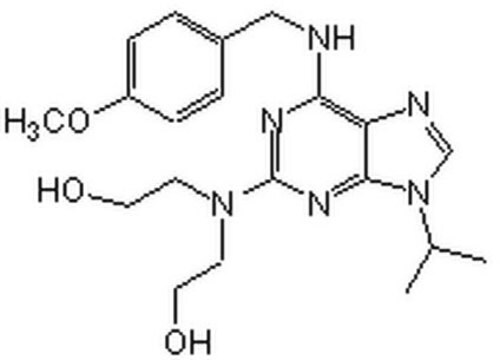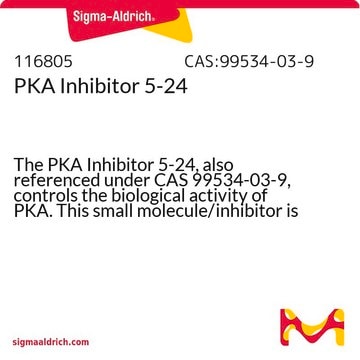219445
Cdk2 Inhibitor II
The Cdk2 Inhibitor II, also referenced under CAS 222035-13-4, controls the biological activity of Cdk2. This small molecule/inhibitor is primarily used for Phosphorylation & Dephosphorylation applications.
Synonym(s):
Cdk2 Inhibitor II, Compound 3
Sign Into View Organizational & Contract Pricing
All Photos(1)
About This Item
Empirical Formula (Hill Notation):
C14H11BrN4O3S
CAS Number:
Molecular Weight:
395.23
UNSPSC Code:
12352200
Recommended Products
Quality Level
Assay
≥95% (sum of two isomers, HPLC)
form
solid
manufacturer/tradename
Calbiochem®
storage condition
OK to freeze
protect from light
color
yellow
solubility
DMSO: 5 mg/mL
shipped in
ambient
storage temp.
−20°C
General description
A cell-permeable, reversible, ATP-competitive, potent and selective inhibitor of Cdk2 (IC50 = 60 nM).
Biochem/physiol Actions
Cell permeable: yes
Primary Target
CDK2
CDK2
Product competes with ATP.
Reversible: yes
Target IC50: 60 nM against Cdk2
Packaging
Packaged under inert gas
Warning
Toxicity: Standard Handling (A)
Reconstitution
Following reconstitution, aliquot and freeze (-20°C). Stock solutions are stable for up to 3 months at -20°C.
Other Notes
Davis, S.T., et al. 2001. Science291, 134.
Legal Information
CALBIOCHEM is a registered trademark of Merck KGaA, Darmstadt, Germany
Storage Class Code
11 - Combustible Solids
WGK
WGK 1
Flash Point(F)
Not applicable
Flash Point(C)
Not applicable
Certificates of Analysis (COA)
Search for Certificates of Analysis (COA) by entering the products Lot/Batch Number. Lot and Batch Numbers can be found on a product’s label following the words ‘Lot’ or ‘Batch’.
Already Own This Product?
Find documentation for the products that you have recently purchased in the Document Library.
The TRESLIN-MTBP complex couples completion of DNA replication with S/G2 transition.
Zonderland, et al.
Molecular Cell, 82, 3350-3365 (2022)
Our team of scientists has experience in all areas of research including Life Science, Material Science, Chemical Synthesis, Chromatography, Analytical and many others.
Contact Technical Service








